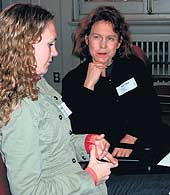 |
| FRIENDLY ADVICE: A mentor can be a valuable guide |
Q. You recently started a new job and are eager to find a mentor. How do you recruit someone for this role?
A. Patiently. Joe Watson, chief executive of Without Excuses, a diversity consulting firm in Reston, Virginia, said that finding a colleague to be your mentor was a form of courtship — a delicate process that takes time.
“Too many workers are waiting for the equivalent of the ‘Career Fairy’ to come down and appoint them a divine mentor who can look out for their interests,” he said. “These types of relationships take chemistry, synergy and trust, none of which happen overnight.”
Q. Why are mentors important?
A. It’s all about perspective. Mentors can provide institutional knowledge about your employer, your industry and the politics involved in both. Neil Fiore, an executive coach in Berkeley, California, said this knowledge enabled employees to “expand the learning curve,” and react to situations from a more informed vantage point.
“Mentors allow you the benefit of their experience to see around corners and anticipate what is coming at you so you can make better decisions,” said Fiore, the author of Awaken Your Strongest Self: Break Free of Stress, Inner Conflict and Self-Sabotage. “That knowledge can be invaluable.”
Q. What qualities should you look for in a mentor?
A. . Find someone whose advice you respect, and who is supportive and willing to offer constructive criticism. Barbara Wankoff, national director of workplace solutions at KPMG, the auditing firm, in New York, said the best mentors were selfless and committed to meeting regularly.
“It all comes down to time and availability,” Wankoff said. “You want a mentor who is going to make your needs a priority, no matter what might get in the way.”
Beyond these characteristics, a colleague’s value as a mentor depends on the type of guidance you want. If you’re interested in sales, for instance, it’s a good idea to choose a mentor from the sales team. If you’re looking to learn more about the company’s new telephone system, seek your mentor in the information technology department.
Vincent Brown, managing partner at Global Lead, a diversity consulting firm in Cincinnati, said employees should note their career goals before setting out to find a mentor. “You can’t be mentored,” he said, “if you don’t know what areas you want to improve.”
Q. Should you seek someone whose life experiences mirror your own?
A. It’s most important to choose someone you trust and can communicate with freely. That needn’t be someone of the same race, sex or ethnicity, although a common background can be helpful.
That was true for Robert Jeffrey Jr, chief executive of ColorsNW, a publishing company in Seattle. Jeffrey said that early in his career, when he was one of a handful of African-Americans at a local newspaper, an African-American woman who had been at the company for years became his mentor.
“She gave me what I call ‘real talk’ about the political environment at the company and how to navigate the place as an African-American,” Jeffrey recalled. “Even if another mentor was completely sincere, he or she wouldn’t have been able to give me that kind of support.”
Q. Once you’ve identified a potential mentor, do you need to formalise the arrangement?
A. There are a wide range of mentor relationships in the workplace. Depending on your company and your mentor, you may not even need to acknowledge the relationship at all. Some employers may require that you notify them of the arrangement, and have both parties sign a standard contract that outlines basic responsibilities for each.
A growing number of companies have taken a third approach, establishing formal mentor programmes through their human resources departments. These programmes pair employees with executives who have volunteered to serve for a certain time period. Most of the matches are based on personality tests administered when participants sign up.
At Dow Chemical, based in Midland, Michigan, more than 8,000 employees have obtained mentors through such a programme. Julie Fasone Holder, corporate vice president for human resources, diversity and inclusion and public affairs, said the effort was intended to make finding mentors less intimidating. She said that when the match didn’t work out, participants were encouraged to try again.
“We’ll set you up with a mentor, but once you’re in the relationship, it’s yours to manage,” Holder said. “If a mentor relationship doesn’t work, we’re perfectly fine with employees going back and finding someone else.

